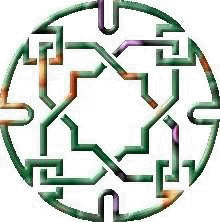

|
|

Philosophers of the Arabs

Malek Ben nabi (1905 –
1973), a prominent Algerian thinker well known of his works about the
conditions of renaissance of the modern Islamic society.
His
Life
Malek Ben nabi was born in
For the aim of studying in
He moved to
His
Thought
Malek ben nabi
has expressed his views in his memories titled 'memories of a witness on the
century'. He outlined his intellectual journey in searching for knowledge and
science and in the search for the reasons behind the European hegemony on the
Islamic world in general and
In 1963, upon returning to
From one of his works, “The
Conditions of Renaissance” (1948), he defined culture as the mode of being and
becoming of a people. This includes aesthetic, ethical, pragmatic, and
technical values. When these contents have been clearly defined, only then
could various formulations of ideas be born. The birth of new ideas equals to a
dynamic society that leads to the movement of vibrancy of a new civilization.
In another book, “The Question
of Culture” (1954), he said, the organization of society, its life and
movement, indeed, its deterioration and stagnation, all have a functional
relation with the system of ideas found in that society. If that system were to
change in one way or another, all other social characteristics would follow
suit and adapt in the same direction. Ideas, as a whole, form an important part
of the means of development in a given society. The various stages of
development in such a society are indeed different forms of its intellectual
developments. If one of those stages corresponds to what is called
“renaissance”, it will mean that society at that stage is enjoying a wonderful
system of ideas; a system that can provide a suitable solution to each of the
vital problems in that particular society. He added that ideas influence the
life of a given society in two different ways; either they are factors of
growth of social life, or on the contrary, the role of factors of contagion,
thus rendering social growth rather difficult or even impossible.
Malek Ben nabi said that in
the nineteenth century, the relations among nations were based on power for the
position of a nation was dependent on the number of its factories, cannons,
fleets and gold reserves. However, the twentieth century introduced a new
development in which ideas were held in high esteem as national and
international values. This development has not been strongly felt in many
underdeveloped countries, for their inferiority complex has created a warped
infatuation with the criteria of power that is based on objects.
Muslims living in an
underdeveloped country will no doubt feel that they are inferior to people
living in a developed country. They will gradually realize that what separates
people is not geographical distance, but distance of another nature. As a
result of this inferiority, Muslims ascribe this distance to the field of
objects. They see their situation as an abomination caused by lack of weapons, airplanes
and banks. Thus, their inferiority complex will lose its social efficacy,
leading only to pessimism on the psychological level. On the social level, it
will lead to what we have elsewhere called takdis
(heaping-up). To turn this feeling into an effective driving-force, Muslims
should ascribe their backwardness to the level of ideas, not to that of
“objects”, for the development of the new world depends increasingly on
ideational and intellectual criteria.
Malek Ben nabi then criticized
the Muslim society today for frequently falling into an apologetic state, where
its members keep on harping on the civilization that once was built by their
forefathers. Muslims tend to circle around the archaic archaeological process,
digging up past treasures instead of bridging progress with new ones.
Obviously corrections need to be
rectified. Although looking back to what had been achieved in the Golden Age of
Islam is still relevant, what is more important is to be able to appreciate the
political values and culture of models and systems implemented by past
prophets, re-interpret and apply these to our contemporary society. Enriching
the society is part of dynamism in Islam. Colonization of minds has driven
Muslims towards a state of moral and psychological decay. Again in his book,
“Islam in History and Society” (1954), moral paralysis results in intellectual
paralysis.
(Partial list)
· Les
conditions de la renaissance (1948)
·
Vocation
de l'islam
· Le problème
des idées dans le monde musulman
·
Le phénomène coranique
·
La lutte idéologique
·
L'Afro-asiatisme
·
Islam
et Démocratie
·
S.O.S
Algérie
·
Idée
d'un commenwealth islamique
·
Naissance
d'une société
·
Perspectives
Algérienne
· Mémoires
d'un témoin du siècle, tome1 et tome2
· Le rôle du
musulman dans le dernier tiers du 20ème siècle
· l'Orientalisme
et la Democratie dans l'islam
·
Contemplations
· Le Musulman
dans le Monde de l'Economie